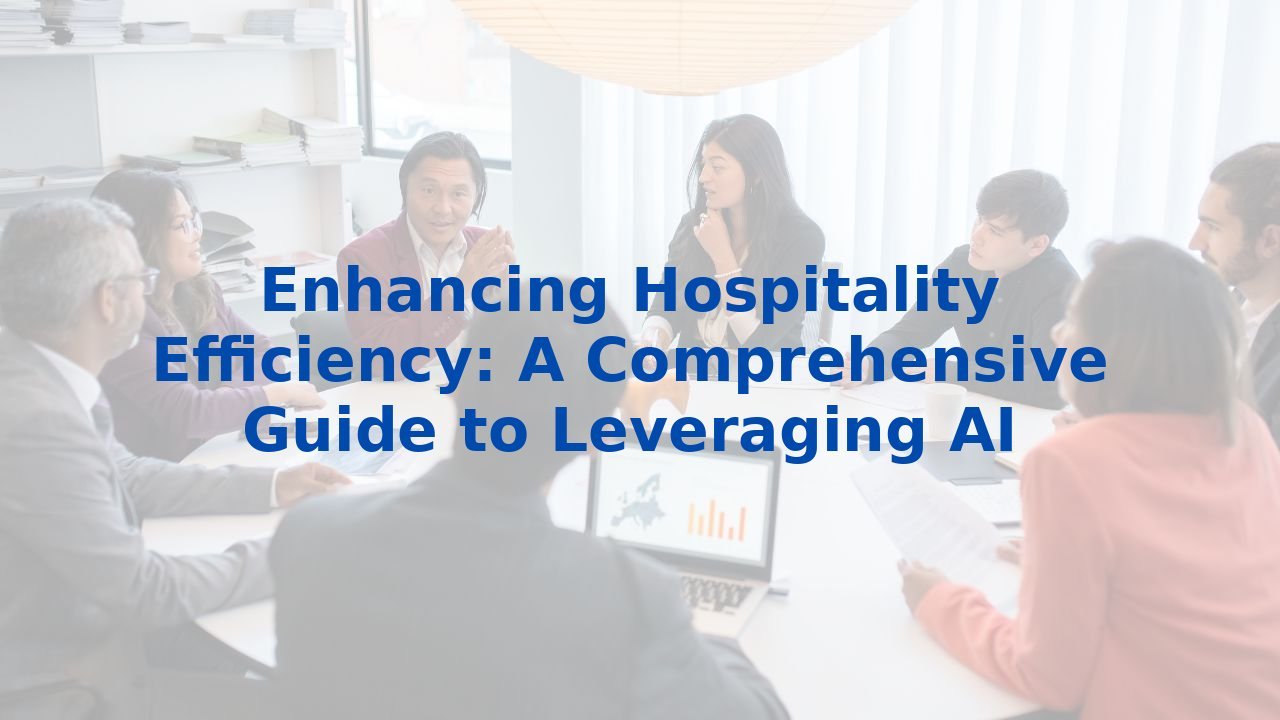Enhancing Hospitality Efficiency: A Comprehensive Guide to Leveraging AI
Enhancing Hospitality Efficiency: A Comprehensive Guide to Leveraging AI
The hospitality industry is a dynamic landscape rich with opportunities for growth and innovation. With venues ranging from bustling restaurants to elegant hotels, the focus is always on enhancing operational efficiency while elevating the customer experience. In this quest for excellence, Artificial Intelligence (AI) emerges as a powerful ally, capable of transforming business processes and driving sustainable gains.
1. Automating Routine Tasks
Imagine a world where routine tasks—those often tedious yet essential components of daily operations—are handled seamlessly by AI. By automating processes such as data entry, invoice management, and appointment scheduling, hospitality businesses can significantly increase efficiency. AI-powered bots can manage customer inquiries, handle reservations, and process payments swiftly and accurately, minimizing the risk of human error.
This is not just about saving time; it’s about liberating human resources to engage in strategic initiatives that genuinely impact growth and customer satisfaction. The result? A workforce that is more innovative, responsive, and focused on creating memorable guest experiences.
2. Process Optimization
As organizations grow, so do complexities within their operations. Fortunately, AI is adept at analyzing workflows, pinpointing bottlenecks, and eliminating redundancies. By restructuring operations and automating manual tasks, hospitality businesses can maximize resource utilization.
Imagine your organization being equipped with the capability to predict demand fluctuations and manage inventory levels optimally. AI empowers businesses to forecast accurately, enabling them to align supply chain operations and reduce waste. This transformational capability leads to faster task completions and an operational framework that is leaner and more cost-effective.
3. Quality Control and Assurance
Quality is a non-negotiable in hospitality. With AI, businesses can adopt an unprecedented level of quality control, ensuring that all products and services meet strict standards. From monitoring food preparation to maintaining cleanliness in guest rooms, AI facilitates real-time assessments that catch defects before they reach customers.
The implications of this are profound—better quality enhances customer satisfaction, reduces waste, and strengthens brand reputation. AI becomes not merely a tool but a guardian of excellence that sustains operational integrity.
4. Customer Service Enhancement
In the hospitality industry, exceptional customer service can distinguish a brand in a crowded marketplace. With AI-driven innovations like chatbots and virtual assistants, businesses can offer personalized interactions that enhance the guest experience dramatically. By quickly responding to inquiries and providing tailored recommendations, AI not only elevates service quality but also allows human staff to focus on complex, high-touch interactions that require a personal touch.
This leads to shorter wait times for customers, more satisfactory interactions, and a burgeoning reputation for outstanding service. AI-driven enhancements create an environment where customers feel valued and understood, leading to brand loyalty and repeat business.
5. Employee Training and Productivity
The integration of AI is not solely a technological shift; it also transforms the way training is conducted. AI-driven learning platforms can tailor training materials to suit individual learning styles, resulting in enhanced knowledge retention and engagement. Imagine an environment where employee training maximizes productivity with employees gaining real-time assistance, alongside resources tailored to their needs.
Beyond mere logistics, robust AI training equips employees with the skills to navigate and utilize these technologies effectively, fostering adaptability and sustaining a competitive edge within the industry.
Benefits of Training Employees for AI
While the advantages of AI implementation are profound, the human element remains irreplaceable. Training employees in AI technologies yields transformative benefits:
- Skill Development: Equipping staff with AI capabilities enables them to leverage technology effectively, automating repetitive tasks and optimizing processes.
- Adaptability: With continuous advancements in AI, a trained workforce adapts quickly to emerging tools, maintaining organizational relevance and competitiveness.
- Enhanced Problem-Solving: Employees will be better positioned to harness AI for innovative solutions, as they develop critical thinking to address challenges.
- Improved Collaboration: Understanding AI empowers employees to collaborate effectively with machines, leading to more productive outcomes.
Conclusion
The journey toward embracing AI in the hospitality industry is not merely about adopting new technology; it’s about reimagining how businesses operate at their core. By automating routine tasks, optimizing processes, ensuring quality control, enhancing customer service, and investing in employee training, hospitality organizations can unlock remarkable efficiencies and growth potentials.
As the industry continues to evolve, leveraging AI becomes a strategic imperative—a pathway to deliver exceptional service while maintaining competitiveness in an ever-changing landscape. The future belongs to those ready to innovate, engage, and enhance the experience for every guest.



